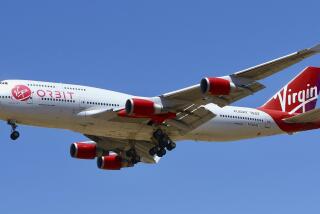Boeing in Talks to Buy Hughes Satellite Unit
- Share via
Boeing Co. is negotiating to buy Hughes Electronics Co.’s satellite-making operation in El Segundo, which pioneered and for 40 years has dominated the commercial spacecraft market, according to industry sources.
The two companies have been in “heavy duty” talks for the last two weeks, people familiar the discussions say, and are trying to close the sale--which could carry a price tag as high as $4 billion--in time for Boeing’s board meeting today. Hughes, owned by General Motors Corp., would retain ownership of its fast-growing DirecTV unit, the leading name in a business that has emerged as the dominant competition to the U.S. cable television industry. In the last several years, Hughes has shed nearly all of its manufacturing operations, including defense electronics, radar, missiles, industrial products and now satellites.
For Boeing, the deal would further strengthen the company’s growing space business in an era when it faces slower growth and stiffer competition in the jetliner industry. Communications satellites, once a minor product of the aerospace industry, have developed into a mainstay as demand soars for transmissions of television, data and voice.
Industry analysts and executives say revenue from satellite services could nearly triple to $140 billion in the next five years. Hughes, the legacy of Los Angeles test pilot, industrialist and movie producer Howard Hughes, employs about 8,000 workers in El Segundo and posted $2.3 billion in satellite sales last year.
Although they described the negotiations as being at an advanced stage, industry sources close to the talks said they have hit two potential sticking points.
One of the key ones is price, with Hughes’ rumored $4-billion asking price being seen as too high. The other appears to revolve around potential liability connected with two previous business deals involving Hughes.
Boeing apparently wants to make sure there will be no surprises stemming from Hughes’ mishap last year involving China, sources said. Hughes took a $92-million write-off after the Clinton administration forced it to withdraw its application for a license to build a mobile phone satellite for a consortium of Asian countries that included China. The State Department had raised concerns that the project could benefit the Chinese military.
In the other deal, Hughes had won a $2.4-billion contract with ICO Global Communications of London to build 12 satellites, but the company filed for bankruptcy protection three months ago. Hughes is now stuck with four satellites, worth about $500 million, that it had already built.
“I wouldn’t be surprised if that was a sticking point, because there is a lot of uncertainty there,” said Paul Nisbet, an aerospace analyst for JSA Research. “They have half a billion worth of satellites in process, and who knows how readily they could be resold?”
Boeing has been trying for years to expand its space business to lessen its reliance on the often-volatile commercial aircraft business. There, it faces heavy price pressure from archrival Airbus Industrie, the European consortium.
“Boeing is heavily leveraged toward the commercial-airplane business, which is more competitive, and its profits have suffered,” said George Hamlin, an analyst for Global Aviation Associates. “They need to continue to diversify within the aerospace business.”
Acquiring the Hughes satellite unit would further expand Boeing’s hot space division, which has scored a series of high-profile military and commercial contracts in the last six months.
In September, Boeing won a contract worth an estimated $5 billion to build the next generation of U.S. military spy satellites. It won the job over rival Lockheed Martin, which had the existing contract. Boeing later won a $500-million contract to launch 40 satellites for Sky Bridge, which is building a satellite system for high-speed Internet services.
With the Hughes division, Hughes Space & Communications, Boeing’s mark on the commercial side in particular would become notably bigger. Hughes Space & Communications controls 40% of the satellites in commercial operation worldwide.
Moreover, the acquisition would enable Boeing to speed development of satellite-based Internet service for passengers on its commercial jets, among other services. Satellites are increasingly used to relay phone calls, faxes and other consumer communications.
For Hughes, a sale of the satellite operation would mean shedding what some analysts view as its “highest-risk” unit and allow the firm to focus on its fast-growing satellite-TV business, DirecTV, and its broadband Internet access system, Spaceway.
Wall Street buzz about the deal sent shares of both companies up. GM’s Class H shares, which represent a dividend interest in Hughes, touched a 52-week high of $108.13 before slipping back to $106.81, still up $4.25 for the day. Boeing shares closed up 19 cents at $43.06.
If the deal happens, “it’s a significant positive” for Hughes, said PaineWebber analyst Thomas Eagan. “It’s a first step in an overall Hughes’ restructuring. It has evolved from aerospace to satellite manufacturing to more of a satellite TV company.”
Without the satellite-making unit, Hughes’ revenue could increase 45% this year instead of 30%, Eagan said.
Other analysts cheered the deal as one that would complement both companies. Hughes’ primary expertise is in satellite communications, whereas Boeing’s strengths lie in system integration and in building global-positioning satellites for the federal government.
“It’s a great combination of a leading company in communications satellites with a company that has a leading role in military satellites,” said John Harbison, defense expert for consulting firm Booz, Allen & Hamilton.
Jim Albaugh, president of Boeing’s Space and Communications division, has said he has wanted to make more acquisitions to beef up the division.
“In the commercial satellite area, we’re going to announce some commercial offerings this year,” Albaugh said in a speech several months ago. “Just stay tuned in this area; it’s going to be exciting.”
More to Read
Inside the business of entertainment
The Wide Shot brings you news, analysis and insights on everything from streaming wars to production — and what it all means for the future.
You may occasionally receive promotional content from the Los Angeles Times.










